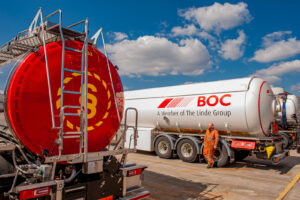At Suttons Tankers, bulk gas transport services make up a significant portion of our workload. We are prepared to operate so substantially in the gas industry due to our large high-spec fleet, complete national footprint, and appetite for capital investment.

No matter what gas substances our customers want to transport, we can support their needs with a core, stable resource that has the flexibility to scale up when required to respond to seasonality.
Carry on reading to learn more about how we transport bulk gas across the country, what makes our equipment so unique, and how we can help your business with solution redesign and continuous development.
What is a gas tanker?
A gas road tanker is a more equipped version of a general purpose (GP) tanker, built to a unique specification to safely house the specific gas that is being transported.
You may not be able to immediately tell the difference between a GP tank and a gas tank by looking at their external design, yet they are very different internally. This is because gas containers have to offer more protection from temperature or pressure.
For example, GP tanks operate under 4.5 bars of pressure, whereas pressurised gas tanks operate under around 20 bars of pressure to transport the gas safely. Cryogenic gases are transported at super-chilled temperatures of below -150oC!
Gas road tanks are not the only equipment that we use to transport bulk gas products. We also transport gas using cylinders and Suttons International operate a fleet of ISO tanks.
ISO tanks offer simplified, flexible solutions for intermodal, international transport. They are moved between road and rail or ship transport, therefore come with a protective external skeleton frame for accidental drops or impacts during transit.
However, bulk gas road tankers offer enhanced payloads and provide additional safety equipment features making them better suited for purely domestic operations.
What do gas road tankers carry?
Gas road tankers can be used to transport many varieties of gas in liquid form, this includes CO2, hydrogen, chlorine, nitrogen, and more. The gas we transport is used in medical, pharmaceutical, industrial, and food chain industries among others.
Suttons Tankers transport gases in one of two ways:
- Cryogenic – gas that is super chilled into a liquid so it can be transported inside a road tank
- Pressurised – gas under immense pressure that forces it into a liquid
Suttons Tankers carry payloads of between 0.7 tonnes and 27 tonnes for the gas industry. Helium is lighter than air and requires so much volume that only 0.7 tonnes can be moved in one load, whereas CO2 would be a 27-tonne payload because it is much denser than air.
We not only operate in the bulk gas market with road tanks, but we also regularly transport liquified petroleum gas (LPG) in both stenched and unstenched specifications using cylinders. This means that we can provide a whole market service for any of our gas industry customers, or prospects.
What types of gas road tankers are there?
There’s not a one size fits all gas road tank. Instead, they are designed bespoke to either specific markets or customers’ needs.
Suttons Tankers use a combination of stainless steel, glass fibre composite, and other specialist coatings for their tanks, with a high-quality lagged interior.
Some tanks may be designed to conduct multiple drops or metred deliveries, others may be designed to enable easier driver-controlled loading and discharge.
Gas tanker specifications
Bulk gas road tanks are designed to a specification that is dictated by the products being transported. For example, some liquid gas products may require more lagging inside the tank than others to be transported safely.
When transporting liquid gas, the payload is fighting against you the whole way. It wants to return to its natural state as a gas, but we are forcing it into a compressed volume to make it a liquid so that it is much more efficient to transport.
If the liquid gas has an opportunity to return to its natural state, this can be very dangerous. For example, if you are transporting cryogenic gas and it begins to warm, the liquid will turn back into gas and it will vent out into the atmosphere. This is not only a concern in terms of payload efficiency, it is an environmental and health and safety concern.
Gas cylinders are transported in cages following safe manual handling for the carriage of transport of gas cylinders, on open vehicles with adequate ventilation.
Gas is so specialist and the equipment is so high tech that it requires a high driver-to-product awareness. This is why Suttons Tankers have a due diligent onboarding process for customers with their key product characteristics, and intense driver training qualifications.
Gas tanker driver training and qualifications
There are some general qualifications that drivers for bulk gas products need such as more than two years of experience driving HGVs.
However, because gas is an incredibly specialist product to transport, load, and discharge, drivers require more in-depth training and qualifications.
Suttons Tankers deliver its own training in house with drivers that are selected for their aptitude. The driver training team work with drivers and our customers on bespoke training modules unique to their needs.
Modules include product awareness, equipment handling, safe loading and discharge, and more for drivers selected for the gas sector based on their enhanced experience and technical expertise in the safe handling of hazardous products.
Read more: Guide to Safety Data Sheets
Bulk gas road tanker transport at Suttons Tankers
Suttons have a national network footprint for the gas industry, so we can be wherever our customers need us at any time.
There is a clear process of continuous improvement at Suttons Tankers, and our solution redesign team are at work to identify areas of opportunity for optimisation for our customers. These efficiencies drive down our cost to serve, offering our customers more value.
If you require assistance with any aspect of bulk gas logistics or other transport services, contact us today.